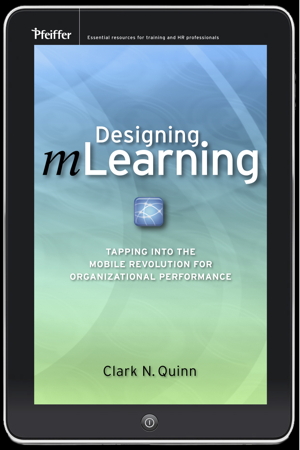 I’m preparing my keynote for a mobile conference, and it’s caused an interesting reflection. My mlearning books came out in 2011, and subsequently I’ve written on the revolution. And I’ve been speaking on both of late, but in some ways the persistent interest in mobile intrigues me.
I’m preparing my keynote for a mobile conference, and it’s caused an interesting reflection. My mlearning books came out in 2011, and subsequently I’ve written on the revolution. And I’ve been speaking on both of late, but in some ways the persistent interest in mobile intrigues me.
While my services are pushing the better design of and the bigger picture of elearning, mobile isn’t going away. My trip to China to keynote this past year was on mlearning (and one the year before), and now again I’m talking on the topic. What does this mean?
As I wrote before, China is much bigger into mobile than we are. It’s likely because we had more ubiquity of internet access and computers, but they’re also a highly mobile populace. And it makes sense that they’re showing a continuing interest. In fact, they specifically asked for a presentation that was advanced, not my usual introduction.
I’m also going to be presenting on more advanced thinking to the audience coming up, because the entire focus of the event is mlearning and I infer that they’re already up on the basics. The focus in my books was to get people thinking differently about mobile (because it’s not about courses on a phone), but certainly that was understood in China. I think it’s also understood by most of the developers. I’m less certain about the elearning field (corporate and education), at least not yet.
In many ways, mobile was a catalyst for the revolution. I think of mlearning as much more than courses, and my models focused on performance support and social more than formal learning. That is really one of the two-fold focuses on the revolution (the “L&D isn’t doing near what it could and should”; to complement the “and what it is doing, it is doing badly” :). In that way, these devices can be a wedge in the door for a broader focus.
Yet mobile is just a platform for enabling the type of experiences, the types of cognitive support, as any other platform from conversation to artificial intelligence. It is an important one, however, with the unique properties of doing things whenever & wherever you are and doing things because of when and where you are.
So I get that mlearning is of interest because of the ubiquity, but the thinking that goes into mobile really goes beyond mobile. It’s about aligning with us, supporting our needs to communicate and collaborate. That’s still a need, a useful message, and an opportunity. Are you mobilizing?
Leave a Reply